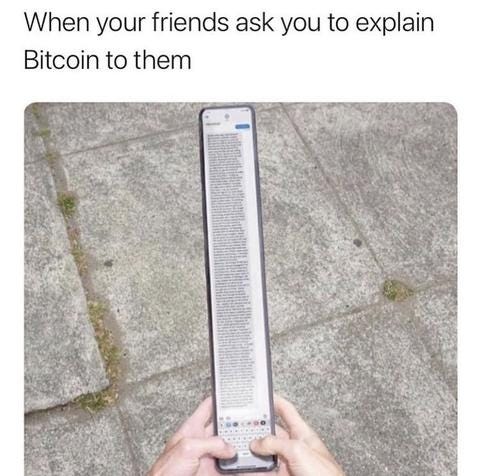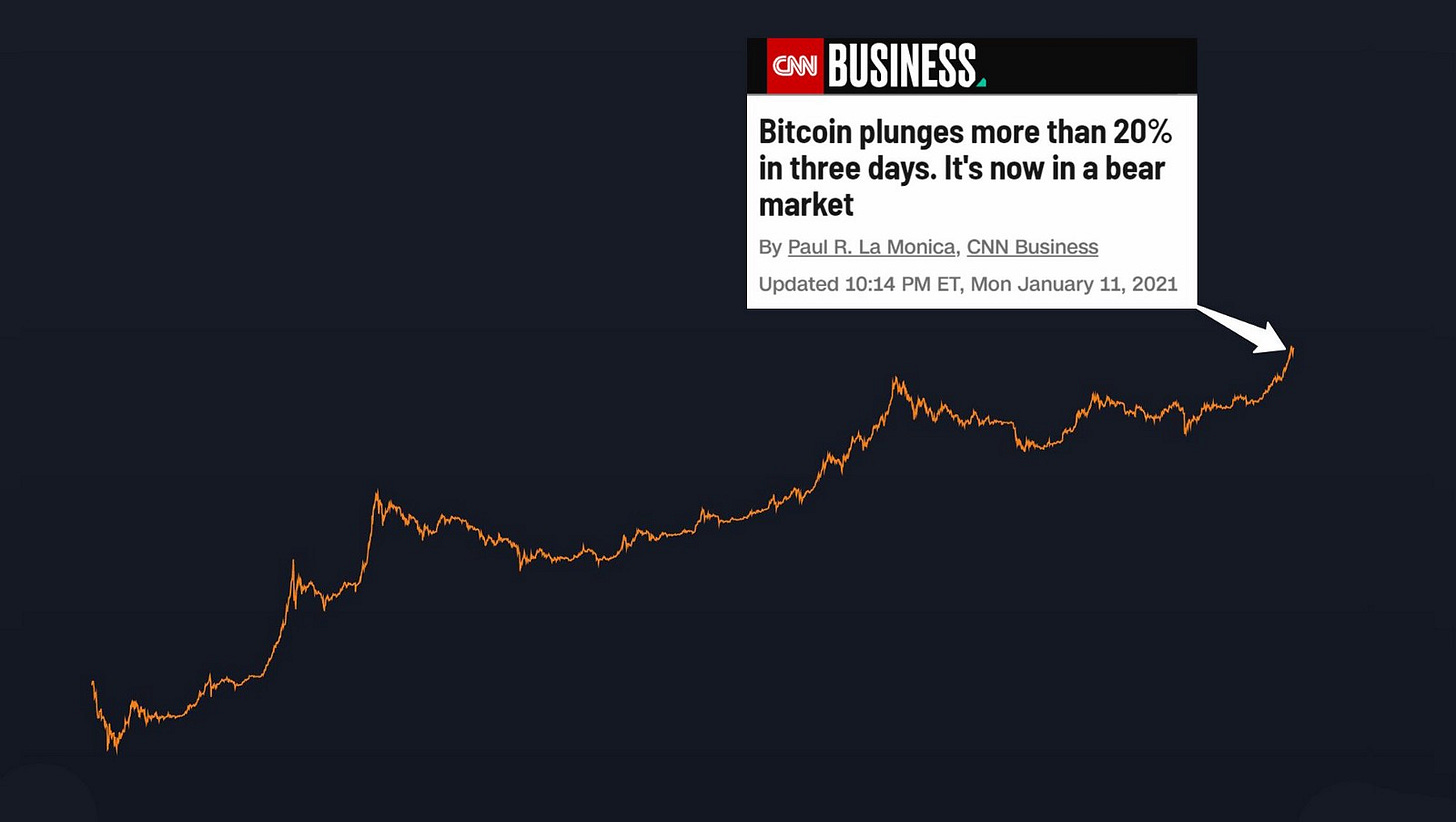I'm writing this guide for the many friends who've asked me about buying cryptocurrency. Most of my friends are creatives, artists, writers, and musicians with no background in computer science or finance, I'm the tech worker outlier who won't stop talking about blockchains and cryptocurrency. I've decided to put my many text threads into this easy to share guide. Please feel free to send this post to any beginners and leave comments on this article with your questions. I’m sure someone else out there is curious about the exact same thing, and learning in public helps everyone. You can also reach out to me directly to ask questions if you’d prefer.
Cryptocurrency can be a complicated and somewhat intimidating topic, but it's also a fun, exciting and revolutionary new technology. I want everyone, regardless of their existing financial and technical literacy, to be as excited about cryptocurrency and blockchains as I am and to feel confident about their knowledge.
This is an article on best practices for buying and holding cryptocurrency. I've written another essay on blockchains for a non-technical audience. I recommend reading the blockchain essay first so you understand what you're buying when you invest in cryptocurrency. Keep in mind, none of this is investment advice. If you end up deciding to buy crypto, this guide will help you get started.
A few important points
It's really not that complicated. This guide is long and comprehensive but please don't let that intimidate you. If you're a beginner, you can feel confident buying a small amount of Bitcoin or Ether using the Coinbase exchange before you even finish reading this. You can use this referral link and get a free $10 of Bitcoin when you buy or sell $100 worth of any crypto. Coinbase is the easiest way to start and it will help you get comfortable with the technology as you learn. You can come back to reference this guide as you grow your investments.
Start small. You don’t need to buy a whole Bitcoin or a whole Ether, you can buy $10 worth of a coin. One of the beauties of crypto is its accessibility, but this accessibility also requires you to protect and educate yourself, especially if you plan to buy a significant amount.
Security is key. When you hold cryptocurrency, you are your own bank. If you lose your crypto, it is gone forever. I’ll walk you through security best practices so that you can protect yourself from getting hacked or scammed.
Prepare for volatility
Cryptocurrency markets are volatile. Don’t put in any money that you’d be devastated to lose and don’t trade with emotion. Don’t worry about intraday and intraweek prices. Unless you’re an experienced day trader (which is likely not the case if you’re reading this) you will probably lose money trying to buy and sell crypto for short term profit. The best thing you can do is find crypto projects you’re excited about and buy their tokens as a long term investment. Start with Bitcoin and Ethereum.
It’s impossible to predict when prices will rise and fall. A lot of people dollar cost average, which means buying a set dollar amount every week or month regardless of price fluctuations. For Bitcoin, this is referred to as “stacking sats” or “satoshis”. A satoshi is 0.00000001 Bitcoin.
If you’d purchased Bitcoin at its 2017 peak of $19,498.63, you would have had a rough four years while it crashed down below $4,000 in 2018. When the market crashed less than a year ago in March 2020, the price went back down below $4,000. I was not joking about the volatility.
I started writing this guide in early January 2021 when Bitcoin has just blown past its 2017 all time high up to $42k. Over 24 hours on January 11, it crashed back down to $30k. This is the largest single day crash in Bitcoin’s history and I’m happy that it happened as I started to write this guide. If you want to hold cryptocurrency, be prepared for volatility and hold on through the volatility. Don’t panic and sell after a crash.
Security basics
Holding cryptocurrency is essentially like holding cash. You are your own sovereign bank. If someone robs you, you’re out of luck. There is no bank or credit card company to pay you back. Before you buy crypto, make sure your general cybersecurity practices are tight.
Password management
Never reuse your passwords. Even if you don’t hold any crypto. Use a password manager to store unique passwords for each account. If you’re one of those people who stores their passwords in a note on their phone, up your security before buying crypto. It’s best to use a series of random letters and symbols rather than words. A good password manager can generate and save these random passwords for you. Keeper, Last Pass, and 1Password are all good options for password management.
Two factor authentication
Use an authenticator app to set up two factor authentication for all of your important accounts (eg your email account, your password manager, banking and crypto accounts). I recommend using Authy and setting it up on multiple devices, on your phone and on a laptop for example. This way, if you lose your phone, you won’t be locked out of all of your accounts. After you have your devices set up with Authy, turn off the ability to add new devices.
I would not use SMS texts for 2 factor authentication on important accounts. I just heard a story of someone losing over 20 million dollars from a Coinbase account after a hacker convinced an AT&T employee to swap their SIM after they “lost their phone.” The hacker used the phone number to get access to the account and poof, 24 million gone.
Buying crypto
To buy crypto, you need to transfer money from your bank onto an exchange.
Coinbase is the easiest and most user friendly exchange for beginners. It has a very simple and intuitive interface. The fees are a bit higher, but if you have no experience with the order book model of buying and selling stocks, this is where you should start. Make sure you connect your authenticator app to your Coinbase account. This will require you to enter a unique code each time you log in from a new device, buy or sell crypto, or withdraw crypto to a wallet.

Once you buy your crypto, it’s best not to leave it sitting on an exchange. Leaving it on Coinbase is fine to start, but if you get more serious about investing, or if you want to use your crypto to explore decentralized exchanges and applications, you need a crypto wallet.
A common phrase among crypto enthusiasts is “not your keys, not your crypto.” If the exchange is handling your private keys for you, they own your crypto. If that exchange is hacked, you are out of luck. If the government blocks the exchange from allowing trades or withdrawals, there’s nothing you can do. If you hold your own private keys, the cryptocurrency is truly yours. If “private key” sounds like gibberish don’t worry, I’ll explain in a second.
Storage
So if you don’t want to store crypto on an exchange, where do you put it? In a wallet. “Hot wallets”, also known as software wallets, are a good place to start. If you want to hold a lot of crypto for a long period of time, a “cold wallet” or hardware wallet is a good next step.
Hot wallets
A hot wallet is a piece of software that lives on your phone or computer. The Coinbase Wallet phone app is a good one to start with. This is a different app than the Coinbase exchange app. In addition to storage, you can use a software wallet to interact with decentralized Web applications, to buy digital art on NFT marketplaces like SuperRare, or to swap tokens on decentralized exchanges like Uniswap. Different wallets support different cryptocurrencies. Coinbase makes a good general purpose starter wallet. The Argent wallet is an interesting new wallet for Ethereum tokens only.

Cold Wallets
If you are buying and holding a lot of crypto, or plan to hold it for a long time, get yourself a hardware wallet. This is sometimes referred to as a “cold wallet” or “cold storage.” Ledger, Trezor, and Cobo make good wallets. Only buy a wallet directly from the manufacturer. Never buy one from Amazon or a third party seller.
An important principle with any crypto wallet: you aren’t storing anything physical in the wallet, you are storing your private keys. These private keys are used to authorize transactions on the blockchain network. The main axiom behind hardware wallets is to provide full isolation between the private keys and your easier-to-hack computer or phone.
Seeds and keys
The terms “seed phrase” and “private key” are sometimes used interchangeably. They are not the same thing, but they are related. Private keys are a 64 digit string of numbers and characters that unlock access to your cryptocurrency. A “seed phrase” is a series of 12–24 short words that will give you access to your private keys. Your seed phrase is the private key translated to english, easier for humans to remember. Private key is the computer version, seed phrase is translated into english. Your seed phrases and private keys are for your eyes only. They are the passwords to unlock access to your crypto.
When you set up a new wallet, you will receive a new seed phrase. If you lose your phone with your hot wallet app on it, you will be able to use the seed phrase to recover it. Similarly, if you lose a hardware wallet, you will be able to recover your wallet using its seed phrase. If you lose your seed phrase and wallet, your access to the crypto stored on that wallet is gone forever.
Never show anyone your seed phrase, never save it in an unencrypted note, never screenshot it on your phone. Write it down on paper and store multiple copies in secure locations. Even better, put it in an encrypted PDF, then copy that PDF onto two separate encrypted thumb drives. Keep them in secure locations. If you store your seed phrases on your computer, on your phone, or in your password manager, you are putting yourself at increased risk of being hacked. If you do this with a hardware wallet seed phrase, you are defeating the purpose of the hardware wallet.
In my opinion, one of the most revolutionary things about cryptocurrency is the seed phrase. Imagine that you have a million dollars of bitcoin and need to flee your country during a civil war. In any other era, your assets would be seized and you would have nothing. In 2021, if you can remember your 12 word seed phrase, you have access to that bitcoin across any border.
A security story to drive the point home
In 2020, the hardware wallet company Ledger had their Shopify account hacked. Hackers gained access to email addresses, phone numbers, and in some cases shipping addresses of Ledger customers. I’m guessing that Ledger has since upgraded their security or begun purging customer credentials after each wallet has been delivered, but the hack is an important lesson for new crypto owners everywhere.
Owners of Ledger hardware wallets began to get emails and text messages that looked like they came from official Ledger company accounts. These were not from Ledger, they were from hackers. If the wallet owners clicked through the links, they were encouraged by what looked like an official Ledger website to enter their seed phrase for “security” reasons — once the hackers got the seed phrase, they used it to drain the Ledger wallets. Protect your seed phrases and private keys.
Key management
If you are planning to hold a large amount of crypto, consider keys.casa or a similar key management company. This is a white glove security service. If you are holding tens of thousands on the lower end, up to billions, this is a great alternative option. It’s also a way to set up a last will and testament with your lawyer, so if something happens to you, your loved ones will be able to inherit your wealth. Read more about Casa’s key management here.
What to buy
This is the number one question I get from my friends. nOnE oF tHiS iS iNvEsTmEnT aDvIcE but if you decide to buy crypto, Bitcoin and Ethereum are the best place to start. These two are currently priced at their respective all time highs. A lot of people prefer to buy coins that are lower in price with the hopes that they could surge to the levels of $BTC and $ETH. There is a higher upside with smaller coins, but also more risk. Cryptocurrencies and blockchains are still new and experimental technologies, it’s too soon to tell which projects will emerge as the long term winners. Bitcoin and Ethereum have proven to be the most successful so far.
Until you do your own research and really understand the space, I wouldn’t buy anything but $BTC and $ETH. I personally like Handshake ($HNS) and Uniswap ($UNI) because I believe in those projects. Research projects diligently and don’t listen to marketing hype. I don’t recommend buying a lot of anything you don’t yet understand. I plan to write more articles on blockchain projects for beginners, so if you’d like to keep learning, please subscribe.
I have multiple friends who’ve told me they love $XRP and $EOS. Those are both considered scams by all of the credible blockchain developers I know. XRP is not a true blockchain. Ripple, the company that created XRP, controls its supply. It is not decentralized. Ripple has used viral bot accounts on social media to create fake hype and convince people to buy XRP. They were just sued by the SEC and Coinbase stopped allowing XRP trades on January 19, 2021.
$BTC
Bitcoin is the first cryptocurrency. It was created by the anonymous Satoshi Nakamoto on January 3, 2009 in the midst of a global financial crisis caused by overleveraged debt. The genesis block, the first block generated by the bitcoin blockchain, contained a single transaction. Embedded into the block was the text “The Times 03/Jan/2009 Chancellor on brink of second bailout for banks.”
Discussions around Bitcoin are often centered on economics, fiscal policy, and politics. There will only ever be 21 million bitcoin, so it is considered inflation resistant while the Federal Reserve money printer goes brrrr. Its price depends on how many people buy and hold the asset. Some big institutional investors began buying up Bitcoin within the last year.
If you grew up in the US, you are accustomed to the relative stability of the US dollar. You might not understand why buying a volatile digital token would be a good way to preserve your wealth. Argentinians understand this deeply. They have seen the value of their peso drop dramatically while their government outlaws exchanging pesos for USD. Imagine watching helplessly while your life savings evaporate due to a corrupt government. Bitcoin has been used by people in El Salvador who can’t set up bank accounts due to government incompetence. It’s been used by anti-police brutality protestors in Nigeria after the government blocked their bank accounts.
If you’d like to understand the perspectives of the most bullish Bitcoin enthusiasts, and the reasons behind predictions of US dollar inflation, I’d carve our some time to read this post from Lyn Alden. It will give you a good understanding of the history of the USD and some indications of where our financial system is headed. Thank me later.
I have just learned that an audio version of this essay is now available. Truly a blessing.
$ETH
I am personally more excited about the future of Ethereum than Bitcoin. Bitcoin is an incredible innovation, but its purpose as a store of value is solid and static. While Bitcoin conversations center around politics, the discussions around Ethereum are usually about developing new and exciting applications. Bitcoin is application specific, Ethereum is general purpose. Ethereum developers have created a number of interesting decentralized applications (dApps). You can use $ETH to buy digital art and unique items in online games, and to trade different tokens on decentralized finance (DeFi) platforms like Uniswap ($UNI). $ETH is even used to buy virtual real estate and objects in virtual reality.
You’re an expert now
Just kidding. Cryptocurrency is a complicated subject and we’ve only just scratched the surface. I do hope this has been a good primer and given you some confidence and a desire to keep learning. The future of the internet is decentralized and peer-to-peer. There will no longer be powerful centralized institutions mediating our exchange of information and value. By buying cryptocurrency, you’re betting on the future of a decentralized and open internet. This new internet is being built as you read this, and now is a great time to get involved.
I plan to keep writing about blockchain projects, emerging technology, culture and philosophy on this Substack, if you enjoyed this article and would like to hear more from me, please subscribe.










That’s really inspiring Nicole... thanks:)